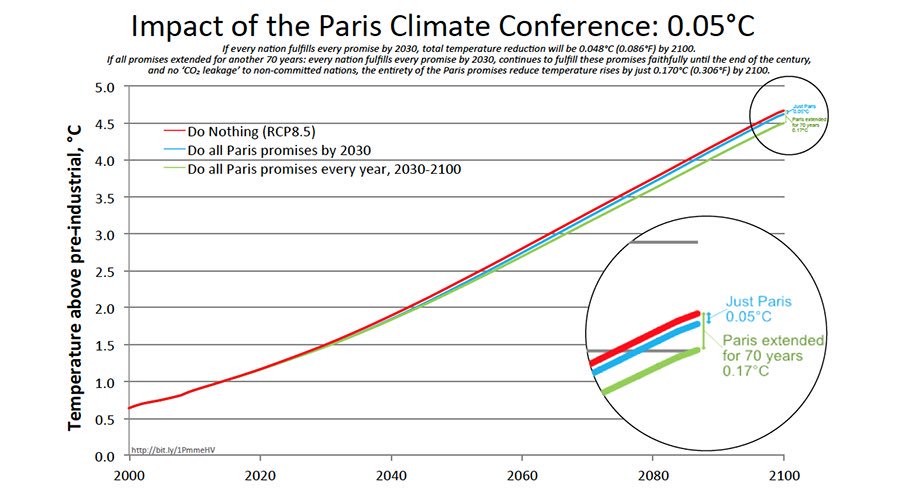The New York Times published a really fascinating interactive article (You Fix It: Can You Stay Within the World’s Carbon Budget?) on the carbon budget idea fielded during the Paris accord. The carbon budget was set at 2,900 gigatons of carbon dioxide in the atmosphere. This is the amount of the gas we can have in the atmosphere to limit warming to no more than 2ºC and prevent the most disruptive effects of global warming. By 2100, projections are we will be at 8,100 gigatons of carbon dioxide, which is three times over the budget. Can we hit the marks at all?
You get to choose various scenarios for carbon emissions worldwide going forward in major areas of the world to see if it keeps us under that budget. The interactive component is interesting. I went and selected the moderate path, but even that wasn't enough:
"Staying under the budget requires large emission cuts starting immediately. This is the point climate scientists have been trying to make for some time — that countries must commit to aggressive reductions in carbon emissions to prevent disastrous effects of climate change. Even if all countries met their Paris targets, it still wouldn’t be enough."
You Fix It: Can You Stay Within the World’s Carbon Budget?
Kinda depressing, all in all. Seems we're on track for this to be civilization's epic fail. Eh, civilization is overrated anyway. I'd say we could go back to nature, except we've kinda screwed all that up too with global scale ecocide and a sixth mass extinction.
(Sorry, I aim to be optimistic with these things, but it's getting a lot more challenging for me to do that.)
You get to choose various scenarios for carbon emissions worldwide going forward in major areas of the world to see if it keeps us under that budget. The interactive component is interesting. I went and selected the moderate path, but even that wasn't enough:
"Staying under the budget requires large emission cuts starting immediately. This is the point climate scientists have been trying to make for some time — that countries must commit to aggressive reductions in carbon emissions to prevent disastrous effects of climate change. Even if all countries met their Paris targets, it still wouldn’t be enough."
You Fix It: Can You Stay Within the World’s Carbon Budget?
Kinda depressing, all in all. Seems we're on track for this to be civilization's epic fail. Eh, civilization is overrated anyway. I'd say we could go back to nature, except we've kinda screwed all that up too with global scale ecocide and a sixth mass extinction.
(Sorry, I aim to be optimistic with these things, but it's getting a lot more challenging for me to do that.)

